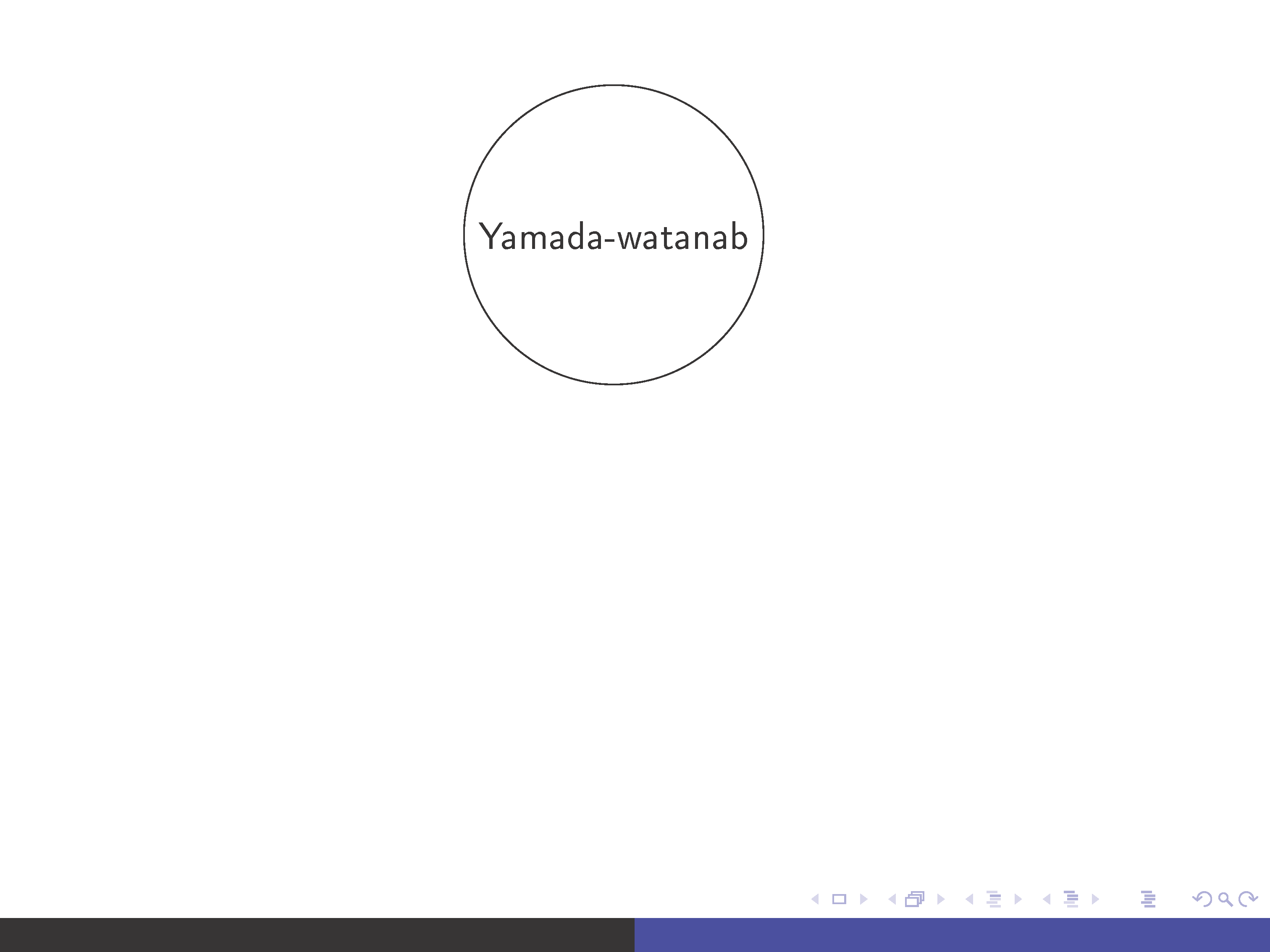
如果可能的话,有人可以帮助我为该图形制作动画Tikz吗Beamer?
我开始更新
1 : ( Yamada-watanab )
2: (Existence faible)
3: (unicite trajectorielle)
4: Tow edges frome (Existence faible) (unicite trajectorielle)
5: one Edge from ( Yamada-watanab ) To (Existence Forte)
6: one Edge from (Existence Forte) to (Defintion) (left one )
7: one Edge from (defintion) (left one) To (Existence faible)
8: One Edge from (unicité trajectorielle) To (Defintion) ( right one)
8: One Edge from (Defintion) ( right one) To (unicité en loi)
9: (unicité en loi)
10: (Engelbert-Cherny)
11: Tow Edge from (Existence Forte) and (Unicité en loi) To (Engelbert-Cherny)
12: One Edge from (Engelbert-Cherny) To (Unicté trajectorielle)
我尝试使用包animated但失败了:
\documentclass[leqno,mathserif]{beamer}
\usepackage{graphics,bm}
\usetheme{Luebeck}
\setbeamercovered{transparent}
\usepackage[utf8]{inputenc}
\usepackage[T1]{fontenc}
\usepackage[english,french]{babel}
\usepackage{tikz}
\usetikzlibrary{positioning}
\usetikzlibrary{matrix}
\begin{document}
\begin{frame}
\begin{figure}
\begin{tikzpicture}
\matrix (magic) [matrix of nodes,ampersand replacement=\&, column sep=7mm, row sep=5mm]{
\node (se) [draw,shape=rectangle] {Existence Forte}; \&
\node (yw) [draw,shape=circle] {Yamada-watanab}; \&
\node (ul) [draw,shape=rectangle] {Unicité en Loi}; \\
\node (d1) [draw,shape=circle] {Définition}; \&
\&
\node (d2) [draw, shape=circle] {Définition}; \\
\node (we) [draw, shape=rectangle] {Existence Faible}; \&
\node (ec) [draw, shape=circle] {Engelbert-Cherny}; \&
\node (pu) [draw, shape=rectangle] {Unicité Trajectorielle}; \\
};
\draw[->, thick] (se) -- (d1); \draw[->, thick] (d1) -- (we);
\draw[->, thick] (we) -- (yw); \draw[->, thick] (yw) -- (se);
\draw[->, thick] (se) -- (ec); \draw[->, thick] (ul) -- (ec);
\draw[->, thick] (ec) -- (pu); \draw[->, thick] (pu) -- (yw);
\draw[->, thick] (pu) -- (d2); \draw[->, thick] (d2) -- (ul);
\end{tikzpicture}
\end{figure}
\end{frame} \end{document}

答案1
如果“动画”的意思是创建覆盖,那么直接应用 Daniel 的visible on键就可以解决问题。
步骤1。将以下内容放入序言中:
\tikzset{
invisible/.style={opacity=0},
visible on/.style={alt={#1{}{invisible}}},
alt/.code args={<#1>#2#3}{%
\alt<#1>{\pgfkeysalso{#2}}{\pgfkeysalso{#3}} % \pgfkeysalso doesn't change the path
},
}
第2步。使用[visible on=<num->]来控制要在特定幻灯片上显示的绘图部分。例如,
\node (se) [draw,shape=rectangle,visible on=<5->] {Existence Forte};
(se)意味着从第五张幻灯片开始将显示节点。
以下应该会产生您想要的叠加效果:
\begin{tikzpicture}
\matrix (magic) [matrix of nodes,ampersand replacement=\&, column sep=7mm, row sep=5mm]{
\node (se) [draw,shape=rectangle,visible on=<5->] {Existence Forte}; \&
\node (yw) [draw,shape=circle,visible on=<1->] {Yamada-watanab}; \&
\node (ul) [draw,shape=rectangle,visible on=<9->] {Unicité en Loi}; \\
\node (d1) [draw,shape=circle,visible on=<6->] {Définition}; \&
\&
\node (d2) [draw, shape=circle,visible on=<8->] {Définition}; \\
\node (we) [draw, shape=rectangle,visible on=<2->] {Existence Faible}; \&
\node (ec) [draw, shape=circle,visible on=<10->] {Engelbert-Cherny}; \&
\node (pu) [draw, shape=rectangle,visible on=<3->] {Unicité Trajectorielle}; \\
};
\draw[->, thick,visible on=<6->] (se) -- (d1); \draw[->, thick,visible on=<7->] -- (we);
\draw[->, thick,visible on=<4->] (we) -- (yw); \draw[->, thick,visible on=<5->] (yw) -- (se);
\draw[->, thick,visible on=<11->] (se) -- (ec); \draw[->, thick,visible on=<11->] (ul) -- (ec);
\draw[->, thick,visible on=<12->] (ec) -- (pu); \draw[->, thick,visible on=<4->] (pu) -- (yw);
\draw[->, thick,visible on=<8->] (pu) -- (d2); \draw[->, thick,visible on=<9->] (d2) -- (ul);
\end{tikzpicture}



